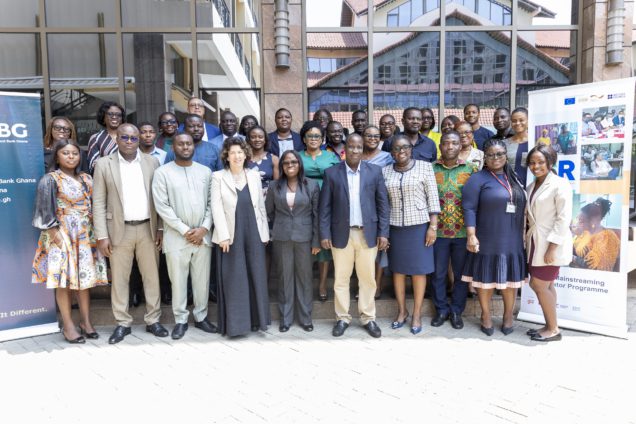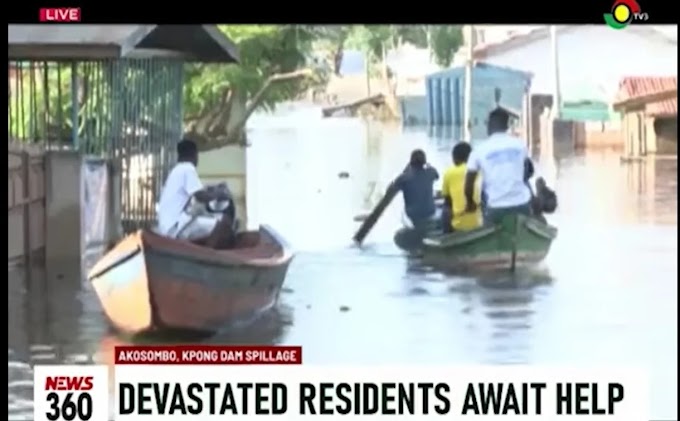Residents of the once-thriving town of Mepe now face a difficult path for survival in the wake of the devastating floods brought on by the spillage of extra water from the Akosombo and kpong dams.
Homes that have been submerged and calls for assistance are the hallmarks of this expedition.
As the heartbreaking sights in Mepe play out, it becomes clear that the town is under water, forcing its citizens to deal with the awful reality. Joshua Sodohu, 12, who spends hours lying on a bare floor, becomes a striking image of the bleak situation.
He's been fighting a stomach ache and constant vomiting for the past two days. Joshua made a moving speech on how the flooding that destroyed his home left him and his mother penniless.
The town, which was once bustling, now stands as a silent testament to the severe effects the environmental catastrophe has had on its most vulnerable citizens. Joshua's situation is only one of several that are being dealt with as daylight comes. Gagkpetor Avi, a farmer who is 69 years old, represents the numerous others who have had everything destroyed by the merciless floods. His tenuous relationship with his children, the final glimmer of hope in the wake of destruction, provides him with the sole solace in the silent aftermath.
This pervasive destruction does not spare even infants and young children. Teachers and students as young as five put their lives in danger when they paddle boats from Mafi Dokpo to Mafi Devime without life jackets. These young students are forced to make this risky trek out of need and are overcome with fear the entire time.
Each room in the Mepe classrooms that have been converted into temporary housing for flood victims can accommodate 20 people. The victims' temporary tent, constructed of plastic and designed to trap heat, only makes things worse for them. Additionally, the sufferers are not given beds, highlighting the difficult living circumstances they face in the wake of this environmental calamity.
This is more than just a tale; it is a universal tragedy inscribed in Mepe. The town, which was once vibrant, now echoes with the depressing tales of its hardy residents.
Residents are still struggling with the harsh reality of dislocation, loss, and the unwavering spirit needed for survival in the face of adversity as they deal with the disaster's aftermath.
pregnant women endure torrential downpours and overflowing rivers to receive prenatal treatment.
As expectant women in the Volta region struggle to obtain necessary healthcare, a moving story is revealed. I travelled with Agness and Naomi on a voyage that vividly depicts bravery, challenges, and an unrelenting dedication to the welfare of their unborn children.
The serene surroundings of the Volta Region serve as the setting for these pregnant moms' hard trek. They travel through seemingly shallow rivers as a simple introduction to the larger waters that are to come.
A canoe, which was waiting on the banks of the second river, was required to take them over. The two moms go out on a brave paddle, navigating the waters of uncertainty for the sake of their unborn children, without life jackets or other safety equipment.
Agnes Bedi and Naomi Asunda's once-routine travel from Achikope to Akpokope turns dangerous due to overflowing rivers brought on by water released from the Akosombo dam. Unfazed, they set out on a perilous canoe trip in search of essential antenatal treatment.
When they get to the third river and a helpful fisherman offers to paddle them to the next town, I and my cameraman spontaneously decided to join them on this perilous voyage.
Nature, however, has its own schemes. Midway through their gallant journey, torrential rain enters the picture, converting the formerly peaceful melody into a symphony of difficulties for these soon-to-be mothers.
The peaceful environment is disturbed by the rain as dangerous reptiles, including snakes, emerge as a result of flooding. When they get in the town, the health center is shut and almost completely under water, making their dangerous expedition appear pointless.
Despite failures, they continue the roughly 45-minute trip back, shivering from the chilly showers and lending a sadder tone to an already difficult scenario.
Importantly, both moms are now living in shelters that are ill-suited for their current needs because their homes have also been submerged by the flood.
Despite the challenges they faced, these experiences demonstrate how resilient people can be when faced with environmental changes. To ensure the safety of their unborn children, these mothers continue on, crossing not only rivers but also the elements.




















.jpeg)
